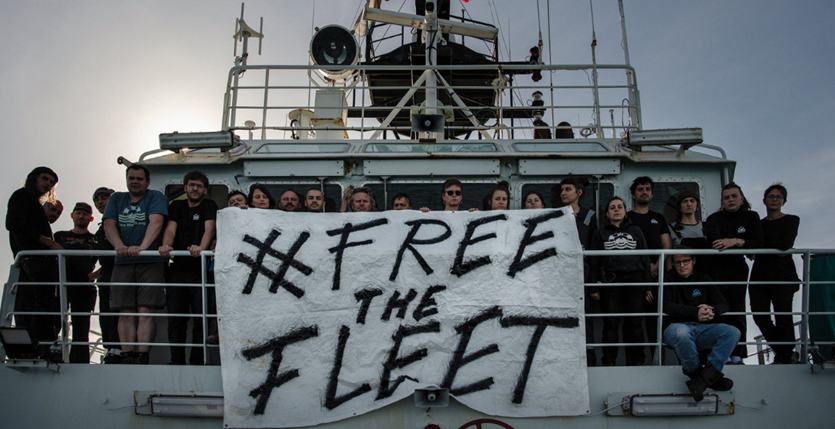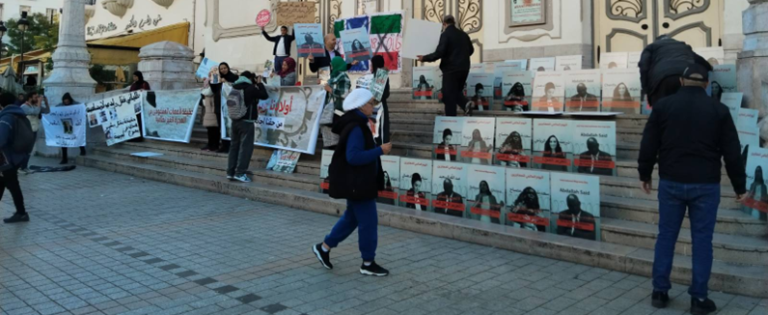By Mediterranea Saving Humans
Some communication expert should advise the Italian government to avoid triumphalist announcements about “reduced landings”: as was the case in 2022 then promptly in 2023, every time a minister in the Meloni government publicly claims fewer arrivals in Italy, the facts disprove him within days.
This was also the case in mid-March 2024: after Interior Minister Piantedosi had claimed the success of the government’s policy of collaboration with the Libyan militias and the Tunisian regime with the result of “seventy per cent fewer landings in the first two months of 2024,” departures from the coasts of Libya and Tunisia immediately resumed and from 14th to 26th of March, more than 5,400 people arrived in Italy (source: Viminale), a figure in line with the 2023 statistics. Many of the landings occurred on Lampedusa, either as spontaneous arrivals or as rescues carried out by the Italian Coast Guard and GdF, but, more significantly, as a percentage in comparison to 2023 through contribution of the civil fleet ships as well.
It therefore seems plausible to attribute the decrease in the number of crossings of the Central Mediterranean in January and February 2024 above all to the weather and consequent sea conditions: it has been several years since such a long period of bad weather and stormy seas has been recorded in winter.
One does not want to underestimate here the considerable efforts made by the Italian government in strengthening the proxy refoulement mechanisms: old and new funding seems to have reached the regime of Kais Saïed and the Libyan militias; the operational capabilities of the Garde Nationale in Tunis and of the Libyan patrol boats (among which the latest new ones donated by Italy and the EU are particularly aggressive) certainly appear to have been augmented; the exchange of information with Frontex and the European authorities has been made more efficient; and the trips of government representatives and officers of the Italian intelligence services to Benghazi and Tripoli are not to be missed.
But once again, the collective intelligence of the people on the move proves capable of devising new ways to challenge the European border control regime, as shown by recent developments in travel trajectories and modes. As an old Venetian proverb says: “you cannot stop water, it will always find ways to flow.”
But the Italian government desperately needs arguments for the Italian and European “permanent election campaign”: there are many regional and local elections in sight and in June there are votes for Brussels and Strasbourg. There is also the competition for “who is the worst” within the right-wing coalition. There is war in the world, and therefore so many internal economic and social problems, that they need to revive the “theatre of fear”: the invasion of migrants is a somewhat worn-out theme, and according to the polls the Italian public opinion itself believes less and less in it, but they can always try to use it.
But this does not mean that the action of the Meloni government is just pure propaganda. On the contrary, it unfortunately translates into concrete measures, laws and practices that exacerbate border violence, and produces more deportations and deaths at sea: almost 400 lives lost between confirmed dead and missing (according to IOM data) in most cases are due to non-assistance. More suffering therefore for women, men, and children on the move.
Let us take a first example: the Italy/Albania memorandum for the creation of extraterritorial detention camps in a non-EU member country. It has been approved by the parliaments of both States and all constitutional exceptions have been addressed. Tenders worth hundreds of millions of euros to set up the camps were also recently approved with great haste. Surely these devices will affect a few hundred people each year and are not “the” solution to the governments’ problems. But at the same time, as was already the case since 2016/2017 with the agreements with third countries, they represent a new “fact that creates law,” a new step in the dismantling of the architecture of international and asylum law in particular, a new step in the dehumanization of people on the move, in their management as a “passive object” in European migration policies.
Let us take a second example: the government’s goal of creating at least one administrative detention center (CPR) in each of Italy’s twenty regions, with the intention of speeding up and intensifying deportations to so-called “safe” countries. Certainly, this unhealthy intention is encountering many obstacles, mainly due to the resistance of the local governments (municipalities and regions) concerned. But at the same time, even moving in this direction has led to a further worsening of living conditions for the people detained there, with an increase in police violence to counter their resistance. Additionally, it has led to a persistent disinvestment in the facilities and paths needed for dignified reception.
Other examples could be shown but let us take a third and final one: from October 2023 to the present day, the Piantedosi Decree-Law has been applied more and more frequently to hit Civil Fleet ships with fines and administrative detentions of twenty to sixty days. It has now become almost a habit, and in March as many as four ships were detained almost simultaneously: Humanity 1, Sea Watch 5, Sea Eye 4 and Geo Barents. But what is striking is the motivation: in all cases the blame is for “failing to cooperate” or even “obstructing” the criminal interception and capture activities of the so-called Libyan Coast Guard during rescue operations that saved the lives of hundreds of people. And, likewise, the government has intensified its efforts in criminalizing newly landed people in an obsessive attempt to increase the statistics on arrested “smugglers.” It is the world turned upside down!

Picture: Maria Giulia Trombini, Sea-Watch, March 2024
In the face of all this, there are just as many signals to the contrary, which speak of solidarity and respect, of continuity in resistance and endurance, by people on the move in the first place, as well as from the Civil Fleet and widespread social movements and initiatives. Solidarity comes, too, on the grounds of respect for the rule of law and of the law itself as a terrain for conflict. Between January and March 2024, there have been several rulings by civil and criminal courts all the way to the Supreme Court of Cassazione that have openly declared the Italian government’s regulations and consequent practices illegitimate: from the request for acquittal for the Iuventa Crew by the Trapani prosecutor’s office and the final decision on the Asso 28 case stating that in any case “Libya is not a safe harbor” up to the orders of the judges of Brindisi and Crotone that respectively freed Ocean Viking and Humanity 1 from the effects of the Piantedosi Decree-Law. There was also questioning before the European courts of the accelerated and onerous procedures for the detention and forced deportation of people. At the same time, the preliminary hearing in Ragusa against seven members of Mediterranea for “aggravated aiding and abiding of illegal immigration” the Mare Jonio / Maerk Etienne case continues, even while the same ship continues to persist in the deployment of her rescue operations.
Perhaps the brutality of the Italian government, and all its contradictions, can also be explained as a response to this long series of practical and judicial defeats for their policies.
What is certain, however, is that 2024 has only just begun and the struggle, on every front, is wide open in its ways and possible outcomes.
March 25th, 2024



